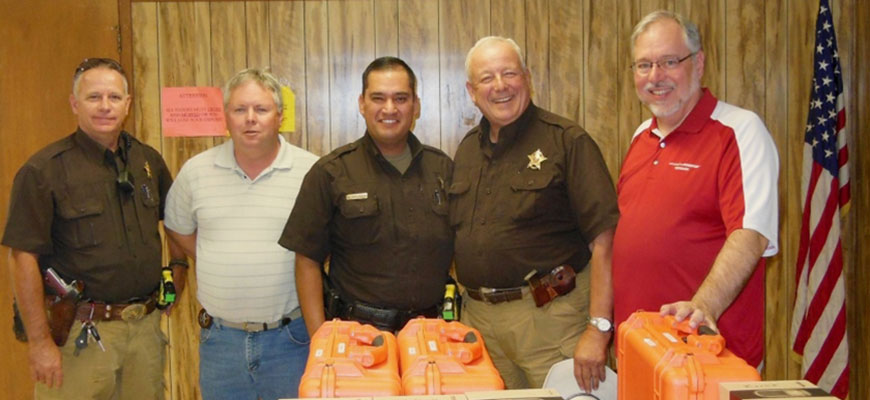
The University of Houston Center for Technology Literacy distributed 88 life-saving air quality gas monitors and 34 charging/calibration stations to emergency first responders (sheriff’s offices, fire departments and emergency medical technicians) in the cities of Kermit, Pecos, Pyote and in the counties of Loving, Reeves, Winkler and Ward in West Texas. Shell awarded $280,000 for 2014 and $150,000 for 2015 to the Center’s Emergency Planning, Information and Communication (EPIC) project for the equipment and training that started in October 2014 and concluded in August 2015.
"Early in our research, we found that first responders had no means of determining the air quality upon arrival at a well site incident. This is critical information in determining personal safety at the site, as well as detection of outgassing flammable agents. This was a critical need that had to be addressed quickly," said Dr. Raymond E. Cline, Jr., Chair of the Department of Information and Logistics Technology in the College of Technology and University of Houston Energy Fellow.
The EPIC project goal was to gather information from emergency responders and government officials in the oil-rich Permian Basin region to identify and prioritize needs and develop a strategic approach for Shell to distribute needed equipment and training to a number of key jurisdictions where Shell has operations in West Texas. The EPIC project helped Shell identify those first responder departments that were in need of life-saving training and critical equipment that would be required if responding to an industrial incident at an industry site.
"With increased industry activity in the region and growing populations stretching the resources of first responder departments, the project revealed that a number of the rural-based first responders departments in the Permian Basin did not get the same levels of funding as large urban departments do, thus there was a need for critical equipment and training for industrial responses," said UH alumnus Scott Scheffler, external relations manager for Shell. "While industry incidents are rare, at Shell safety is a top priority where we operate and that includes making sure our first responder have the equipment and knowledge they need to perform their jobs."
In the summer of 2015, Shell, along with the University of Houston, held classes to teach emergency responders the proper way to operate personal air monitors that measure the presence of invisible gas in the air that might be present in a loss of well control incident. In addition to the donation of equipment and training, Shell secured warranties for all of the equipment deployed. Shell’s investment comes with a two-year warranty. According to one of first responders who attended the training session, "Other companies have donated equipment to the Fire, Police, Sheriff, and EMS departments in the past. That equipment did not come with training support or warranty service."
The University of Houston is working on a program with the West Texas Energy Consortium (WTxEC) to ensure training and warranty services continues past the first two-year commitment made by Shell.